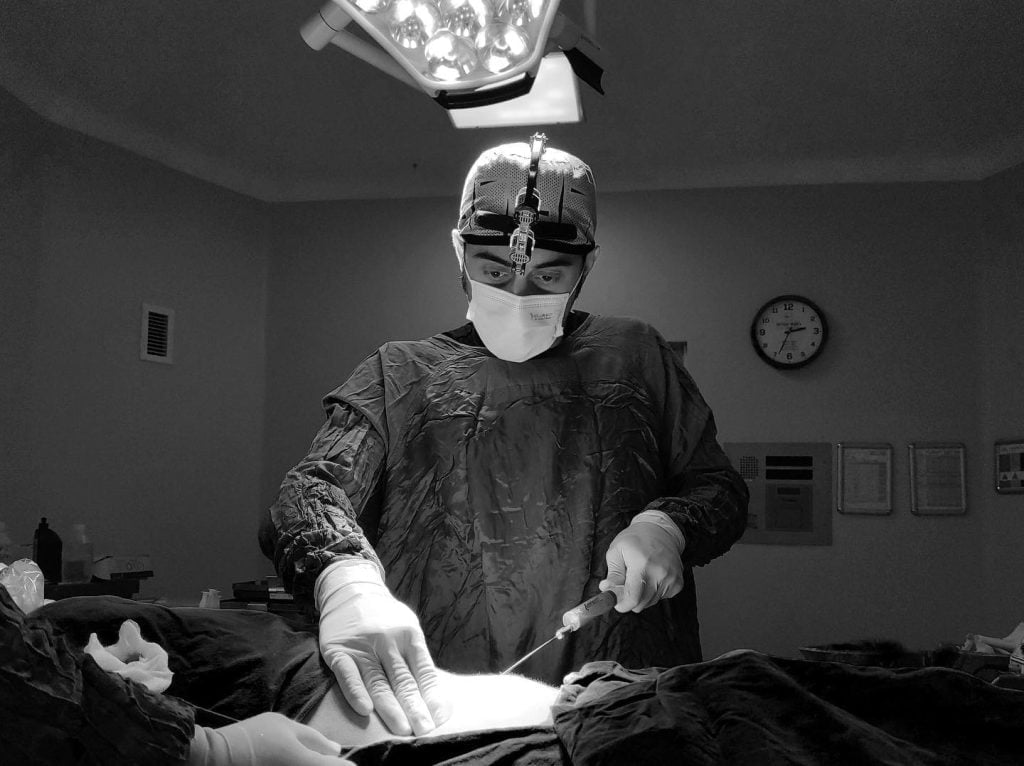Facial Feminization Surgery (FFS) is a deeply personal and transformative process. If you’re considering FFS, you’re likely excited about the prospect of aligning your facial features with your gender identity. However, like any surgical procedure, FFS does have certain requirements to ensure your safety, maximize your chances of a successful outcome, and confirm that you’re truly ready for this significant step in your transition journey.
These requirements aren’t meant to be barriers, but rather guidelines to help you approach FFS in a well-prepared and informed way. They encompass medical, psychological, and practical considerations. Let’s break down the key requirements for FFS to help you understand what’s typically expected and how to assess your own readiness.

Table of Contents
Medical and Health Requirements: Prioritizing Your Safety
Your overall health and medical history are paramount when considering any surgery, and FFS is no exception. Surgeons prioritize your safety above all else.
Good General Physical Health
Being in good general health is a fundamental prerequisite for FFS. Surgery, even when elective, is a physical stress on the body. Good health allows you to:
- Tolerate Anesthesia Safely: Anesthesia carries inherent risks, and pre-existing health conditions can increase these risks. Being in good health minimizes anesthetic complications.
- Heal Optimally: Your body’s healing processes work best when you are healthy and have a strong immune system. Good health promotes faster and more effective recovery after surgery.
- Minimize Complication Risks: Certain health conditions can increase the risk of surgical complications like infection, bleeding, or poor wound healing.
Surgeons will typically require a thorough medical history and may request pre-operative medical evaluations or clearances from your primary care physician to ensure you are fit for surgery.

Absence of Contraindications (Certain Medical Conditions)
Certain medical conditions can be considered contraindications (reasons not to proceed with surgery) for FFS, or may require careful management and optimization before surgery can be considered safe. Common examples include:
- Uncontrolled Diabetes: Poorly controlled diabetes can significantly impair wound healing and increase infection risk. Diabetes needs to be well-managed with stable blood sugar levels before FFS.
- Severe Cardiovascular Disease: Serious heart conditions or uncontrolled hypertension can pose significant risks during surgery and anesthesia. Cardiac health needs to be assessed and optimized.
- Bleeding Disorders: Conditions that affect blood clotting or medications that thin the blood (anticoagulants) increase the risk of excessive bleeding during and after surgery. These need to be carefully managed, and certain medications may need to be temporarily discontinued (under medical supervision).
- Active Infections: Any active infection, whether localized or systemic, must be treated and resolved before elective surgery to prevent the spread of infection.
- Severe Autoimmune Diseases (May be Relative Contraindication): Severe autoimmune conditions or those requiring immunosuppressant medications may increase infection risk and affect healing. These cases require careful evaluation and surgeon discretion.
- Smoking: Smoking severely impairs wound healing, increases the risk of complications, and negatively affects anesthetic outcomes. Most surgeons require patients to stop smoking for a significant period before surgery (often several weeks, if not permanently).
This is not an exhaustive list, and every individual’s medical history is unique. Open and honest communication with your surgeon about your health history is crucial. They will assess your specific situation and determine if FFS is medically safe for you at this time, or what steps are needed to optimize your health before surgery.
Pre-Operative Health Optimization
Even if you don’t have major contraindications, surgeons may recommend steps to optimize your health before FFS to enhance your safety and recovery:
- Smoking Cessation: As mentioned, quitting smoking well in advance of surgery is usually mandatory.
- Weight Management: Being at a stable and healthy weight is generally recommended. Obesity or being significantly underweight can increase surgical risks in some cases.
- Blood Sugar Control (if diabetic): Strict management of blood sugar levels is essential for diabetic patients before surgery.
- Blood Pressure Management (if hypertensive): Well-controlled blood pressure is important for surgical safety.
- Medication Review: Your surgeon will review all your medications and supplements. Certain medications (like blood thinners, some herbal supplements) may need to be temporarily stopped before surgery to minimize risks.
- Pre-operative Tests: Expect to undergo pre-operative tests like bloodwork, an ECG (electrocardiogram), and potentially other tests as deemed necessary by your surgeon based on your medical history.
Psychological and Emotional Requirements: Ensuring Readiness and Well-being
FFS is not just a physical transformation; it is deeply intertwined with your emotional well-being and gender identity. Psychological readiness is as important as physical health.
Stable Gender Identity and Gender Dysphoria
FFS is a gender-affirming surgery, intended to alleviate gender dysphoria and enhance congruence between your appearance and your gender identity. A requirement is typically having a stable and well-established gender identity as transgender or non-binary, and experiencing gender dysphoria related to facial features.
- Understanding Your Gender Identity: It’s important to have a clear and consistent understanding of your gender identity as transgender or non-binary before pursuing FFS. FFS is not about “finding” your gender identity, but rather about aligning your physical appearance with an identity you already know to be true.
- Facial Dysphoria as Motivation: FFS is undertaken to address gender dysphoria specifically related to facial features perceived as incongruent with your gender identity. You should be able to articulate which facial features cause you dysphoria and how feminization surgery can help alleviate this distress.
- Not a “Cure” for Underlying Issues: FFS is not a solution for unrelated mental health issues, relationship problems, or general unhappiness. It’s crucial to have realistic expectations and understand that FFS is designed to address facial dysphoria, not to solve other life challenges.
Realistic Expectations and Informed Consent
Having realistic expectations about FFS outcomes is crucial for satisfaction.
- Understanding Surgical Limitations: FFS can achieve significant facial feminization, but it has limitations. Surgeons work within the bounds of your existing anatomy. Perfect or idealized results are not guaranteed, and striving for unrealistic expectations can lead to disappointment.
- Focus on Feminization, Not Perfection: FFS aims for a more feminine appearance, not flawless beauty or complete erasure of all masculine traits. The goal is to create a harmonious and balanced feminine face that aligns with your gender identity.
- Understanding Risks and Recovery: You need to be fully informed about the potential risks, complications, recovery process, and limitations of FFS procedures. Informed consent means understanding the potential downsides as well as the benefits.
- Mature Decision-Making: FFS is a major, irreversible decision. Surgeons want to ensure you are making this decision with emotional maturity, a clear understanding of the implications, and not under duress or external pressure.
Mental Health Assessment (May be Recommended, Not Always Required)
While not always a strict requirement from every surgeon, a mental health evaluation by a therapist experienced in gender issues is often recommended or can be beneficial.
- Assessing Psychological Readiness: A therapist can assess your overall psychological readiness for surgery, your coping mechanisms, and your support system.
- Managing Expectations: Therapy can help you process emotions related to surgery, manage expectations realistically, and develop coping strategies for the recovery period and beyond.
- Addressing Underlying Mental Health Concerns: If you have pre-existing mental health conditions like anxiety, depression, or body image issues, therapy can help ensure these are well-managed before surgery to optimize your emotional well-being throughout the FFS journey.
- Support for Emotional Aspects of Transition: Therapy provides ongoing support for the broader emotional aspects of gender transition, of which FFS is a part.
While a formal mental health letter might not be universally mandated for FFS in all locations or by all surgeons (regulations vary), prioritizing your mental and emotional well-being and seeking support if needed is always a wise step when considering such a significant surgery.
Practical and Logistical Considerations: Being Prepared for the Process
Beyond medical and psychological factors, practical and logistical considerations are important for a smooth FFS journey.
Adequate Time on Hormone Replacement Therapy (HRT) (Typically Recommended)
While not a hard “requirement” in the strictest sense, most surgeons strongly recommend being on Hormone Replacement Therapy (HRT) for a certain period before FFS, typically 12-24 months.
- Allowing HRT Effects to Manifest: HRT induces facial feminization through soft tissue changes (fat redistribution, skin softening). Waiting allows these hormonal effects to fully develop, so surgeons can assess your feminized baseline and plan surgery more effectively.
- Refining FFS Goals: As HRT feminizes your face, your perception of your facial dysphoria might evolve. Waiting allows you to refine your FFS goals, focusing surgery on the features that remain a source of dysphoria after HRT has had its effect.
- Surgeon Assessment Accuracy: Surgeons can more accurately assess your facial structure and plan surgical procedures once your face has undergone a period of hormonal feminization.
While some individuals may pursue FFS prior to or without HRT, discussing the potential benefits of HRT beforehand with your surgeon is crucial. They can advise on the best approach for your individual situation.
Age Considerations (No Upper Limit, Parental Consent for Minors)
- No Upper Age Limit: There is generally no upper age limit for FFS as long as you are in good enough health to undergo surgery and anesthesia safely.
- Minimum Age (Usually 18 or Older): FFS is typically performed on adults aged 18 and older.
- Minors (Under 18): For individuals under 18, parental or guardian consent is legally required, and surgeons will carefully assess maturity, stability of gender identity, and parental support before considering FFS. FFS in minors is less common and requires careful ethical and medical considerations.
Financial Resources: FFS is a Significant Investment
FFS is a financially significant undertaking.
- Cost of Surgery: FFS costs vary widely depending on the procedures involved, surgeon’s fees, hospital fees, anesthesia fees, and geographic location. Researching the costs of the procedures you are considering and understanding the surgeon’s pricing structure is essential.
- Hidden Costs: Budget for potential hidden costs like consultation fees, pre-operative tests, post-operative medications, compression garments, travel expenses, accommodation, and time off work (lost income).
- Financing Options: Explore financing options if needed, such as medical loans or payment plans offered by some clinics.
Financial readiness is a practical requirement that needs careful planning. Cost should not be the only factor in choosing a surgeon, but financial planning is a necessary part of preparing for FFS.

Support System and Aftercare Plan
Having a solid support system and a well-thought-out aftercare plan is crucial for a successful FFS recovery.
- Post-Operative Caregiver: Arrange for a responsible adult to stay with you, especially for the first few days after surgery. You will need help with medication, meals, mobility, and emotional support.
- Emotional Support Network: Lean on your support network of friends, family, or support groups for emotional encouragement throughout the process, especially during the recovery period.
- Realistic Recovery Plan: Understand the recovery timeline, plan for adequate time off work, and prepare your home environment for a comfortable and conducive recovery.
- Access to Follow-Up Care: Ensure you understand the surgeon’s follow-up care plan and have logistical access to attend all scheduled post-operative appointments.
Realistic Lifestyle Adjustments Post-FFS
Be prepared for some lifestyle adjustments, both short-term and potentially long-term, after FFS.
- Recovery Period Lifestyle Adjustments: Be prepared to follow post-operative instructions diligently, which may include activity restrictions, wound care routines, dietary adjustments, and medication schedules during the healing phase.
- Long-Term Skincare and Sun Protection (Important): Protecting your facial skin from sun exposure becomes even more crucial after FFS, especially for incision sites. Incorporate daily sunscreen use into your routine long-term to minimize scarring and maintain skin health.
- Potential Maintenance (Non-Surgical Treatments): As you age, you may choose to consider non-surgical treatments (Botox, fillers, etc.) to maintain a youthful appearance, just as anyone might as they age naturally.

Conclusion – Checking the Boxes, Empowering Your Journey:
The requirements for Facial Feminization Surgery are in place to protect your health, ensure your readiness, and maximize the likelihood of a positive and fulfilling experience. They are not insurmountable obstacles, but rather guideposts on your journey toward facial congruence. By addressing these medical, psychological, and practical considerations, you empower yourself to approach FFS from a position of strength, preparedness, and realistic expectations. The next crucial step is to schedule consultations with experienced FFS surgeons to discuss your individual circumstances and embark on this transformative path with confidence.
Ready to explore if FFS is right for you? Schedule consultations with specialist Facial Feminization Surgeons today to discuss your individual needs, assess your readiness, and take the next step in your journey.

Visit Dr.MFO Instagram profile to see real patient transformations! Get a glimpse of the incredible results achieved through facial feminization surgery and other procedures. The profile showcases before-and-after photos that highlight Dr. MFO’s expertise and artistic vision in creating natural-looking, beautiful outcomes.
Ready to take the next step in your journey? Schedule a free consultation with Dr. MFO ( Best Facial Feminization Surgeon for You) today. During the consultation, you can discuss your goals, ask any questions you may have, and learn more about how Dr. MFO can help you achieve your desired look. Don’t hesitate to take advantage of this free opportunity to explore your options and see if Dr. MFO is the right fit for you.









